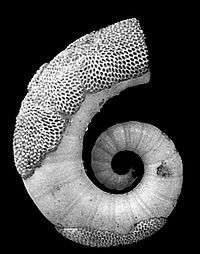Jellyella
| Jellyella | |
|---|---|
 | |
| Jellyella eburnea on a Spirula shell | |
| Scientific classification | |
| Kingdom: | Animalia |
| Phylum: | Bryozoa |
| Class: | Gymnolaemata |
| Order: | Cheilostomata |
| Family: | Membraniporidae |
| Genus: | Jellyella Taylor and Monks, 1997 |
Jellyella is a genus of bryozoan in the family Membraniporidae.[1]
Etymology
The genus is named in honour of the Eliza Catherine Jelly (1829–1914), of Cornwall, England in honour of her contributions to the study of bryozoans.[1][2]
Morphology
Jellyella closely resemble Membranipora, and in common with other members of the family Membraniporidae has twinned ancestrular zooids. However, Jellyella can be distinguished by the presence of intricately branched processes (called spinules) projecting into the zooidal chambers. Jellyella also have a calcitic skeletal ultrastructure made up of transversely arranged, elongate spindles.[1]
Ecology
Jellyella is unusual in being a pseudoplanktonic bryozoan found encrusting floating objects, both natural and artificial.[1] Jellyella eburnea is common on shells of the squid Spirula (which become detached from the soft body of the squid after death) and on the shells of the planktonic gastropod Janthina.[1]
Jellyella tuberculata grows on the floating alga Sargassum,[1] and on flat-bladed kelp and other seaweeds around the Cape Peninsula of South Africa. In Cape waters it is preyed upon by the crazed nudibranch, Corambe sp.[3]
By contrast, most other bryozoans are benthic, encrusting hard substrates such as kelp or rocks.
Species
- Jellyella eburnea (Hincks, 1891). Tropical Pacific, Atlantic, Indian Oceans.[1]
- Jellyella tuberculata (Bosc, 1802). Widespread, subtropical. Colloquially known as the Gulf weed bryozoan.[1]
References
- 1 2 3 4 5 6 7 8 Taylor, P. D.; Monks, N. (1997). "A new cheilostome genus pseudoplanktonic on molluscs and algae". Invertebrate Biology. Invertebrate Biology, Vol. 116, No. 1. 116 (1): 39–51. doi:10.2307/3226923. JSTOR 3226923.
- ↑ "Biographical Etymology of Marine Organism Names. I & J". Retrieved 2007-09-22.
- ↑ Branch, G.M., Branch, M.L, Griffiths, C.L. and Beckley, L.E. 2005. Two Oceans: a guide to the marine life of southern Africa ISBN 0-86486-672-0